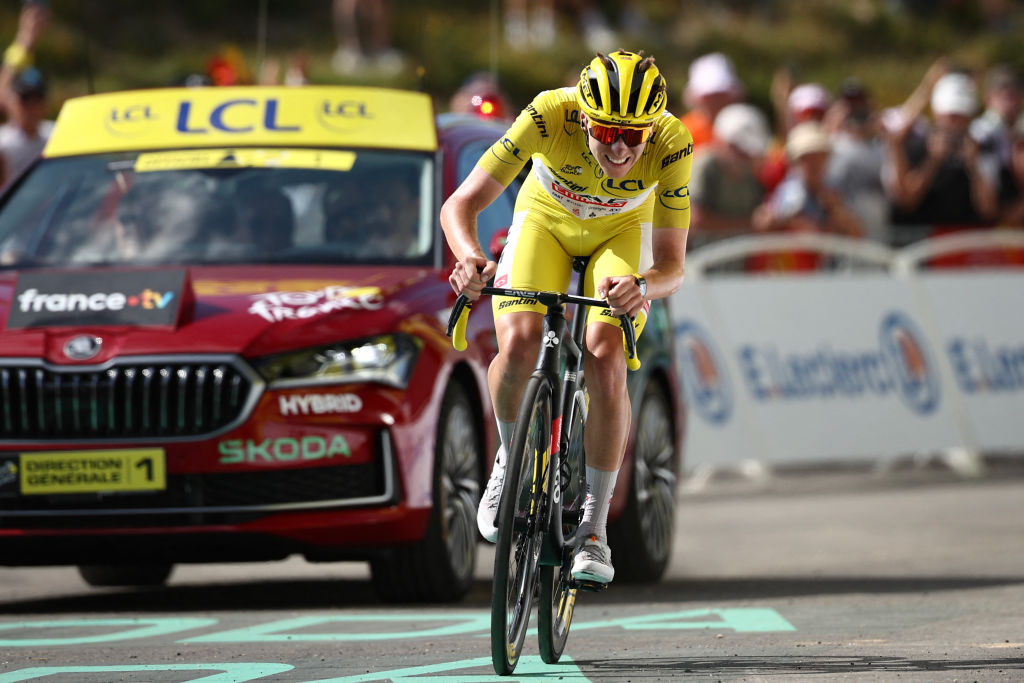
The performance may have exceeded any ever produced in the mountains of the Tour de France, but the aftermath was familiar. At this race, stories have a habit of repeating themselves through the eras as though they had never happened before.
When Tadej Pogačar produced a display for the ages at Plateau de Beille on Sunday afternoon, breaking the late Marco Pantani's record for the ascent by an estimated 3:40, he was always likely to face a familiar question in his rest day press conference: how could he explain it?
These days, a winning rider will rarely say that they were simply much stronger than everybody else. Pogačar gave much of the credit for his remarkable time at Plateau de Beille to the pace-making of Jonas Vingegaard and his Visma-Lease a Bike teammate Matteo Jorgenson on the lower slopes.
"Yesterday, I think we all witnessed one of the best performances on the climbs ever," Pogačar told reporters in a video conference on Monday afternoon. "For myself also, when I checked my numbers afterwards, it was really crazy, especially the part where Matteo Jorgenson and Jonas went on the front – that was the highest numbers I ever did in my career. It was a big day.
"We can see that Jonas came here really prepared to fight for the victory. Yesterday, they really showed the balls, finally, and they hit hard. So really hats off to them for yesterday, for the whole Visma team, they did a super good ride. In the end, it was just an all-out effort from the bottom to the top. It was crazy, crazy stage."
Pogačar's performance did not take place in a vacuum. The first three riders on the stage all finished inside Pantani's 1998 time, after all, while this season alone has seen record-setting average speeds at six Classics, including Milan-San Remo, the Tour of Flanders and Paris-Roubaix.
Since the turn of the decade, the sheer intensity of bike racing has morphed almost beyond all recognition, and that process has seemed to accelerate still further in 2024. The more cautious tactical approaches of yesteryear have been overtaken by the almost reckless abandon of a select cadre of today's peloton.
"Cycling is evolving so much, I must say," Pogačar said. "Six years ago, when I came to this team, and I don't want to speak bad about the team, it was totally different. If I compare this year to my first year in Vuelta, it was almost amateur. Back then, I thought everything was professional, but we moved on really fast. Every team pushes each other with technology, with nutrition, with training plans, with altitude camps. Especially Visma and UAE, and Ineos and Trek and QuickStep, we push each other to reach new limits.
"Yesterday, we witnessed the fastest-ever climbing and we should be seeing something like this every year because everybody is focusing so much on the details – every single gram of the food, every single watt you can save on the bike. We are going super fast. For me, it's really impressive to see how things changed in the last six years of my professional career."
On Friday, Escape Collective reported that UAE Team Emirates, Visma-Lease a Bike and Israel-Premier Tech have been using carbon monoxide rebreathers to optimise the benefits of altitude training. When Pogačar was asked on Monday to give some specific examples of what had changed since his professional career began in 2019, he reached for a rather humbler innovation.
"For example, six years ago, when I started, it was a lot about carbohydrates, we had white pasta, white rice and maybe omelette for breakfast," he said. "Now we have more normal breakfast, like rice porridge, oatmeal, pancakes, bread. I think this little thing already makes a difference.
"The bikes are also so much faster, especially the tyres. The tyres make the biggest difference from what we had six years ago or 10 years ago, and the wheels, aerodynamics, frames, it's just amazing how different the bike is now."
The week ahead
In the Tour de France overall standings, Pogačar carries a lead of 3:09 over Vingegaard into the final six stages of the race, with Remco Evenepoel, third at 5:19, the only other rider within ten minutes of his maillot jaune. On the weekend's evidence, Pogačar is strongly favoured to claim his third Tour victory, but he knows that Vingegaard and his Visma squad are unlikely to lay down arms just yet.
The final week includes a tricky run to Superdévoluy on Wednesday and then back-to-back summit finishes at Isola 2000 and the Col de Couillole ahead of the final time trial to Nice. Pogačar earmarked those final two road stages in the Alps as the days where Vingegaard and Visma were likely to go for broke.
"I don't think they're picking both stages, Friday and Saturday, I think they will focus on one of them," Pogačar said. "We will try to do our own race and try to defend so they cannot do anything crazy. For sure they will try.
"Jonas said yesterday that he is not giving up on the fight, and I think that's correct what he said. It's going to be a tough final week and we're going to see a lot of fireworks for sure, from everybody."
At this remove, Pogačar looks destined to ride into Nice in yellow and become the first man since Pantani in 1998 to win the Giro-Tour double, but he – all but – dismissed the prospect of adding the Vuelta a España to his schedule for a tilt at the treble.
"This year it's 99% impossible," he said. "For next year, it's a much bigger chance to see me in the Vuelta."
Get unlimited access to all of our coverage of the Tour de France - including breaking news and analysis reported by our journalists on the ground from every stage of the race as it happens and more. Find out more.







